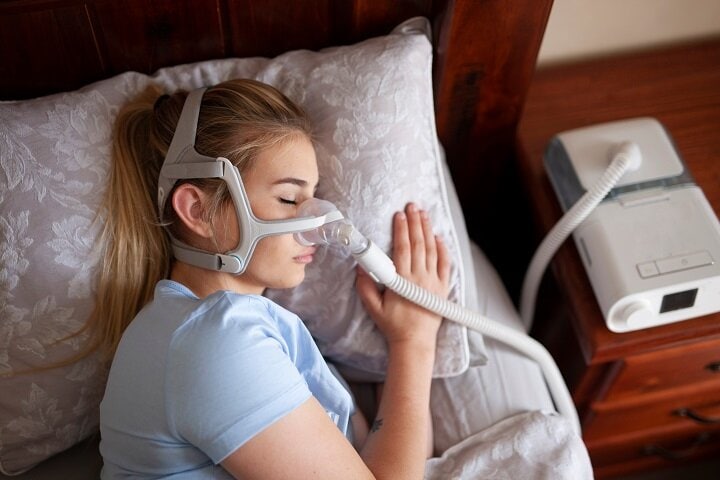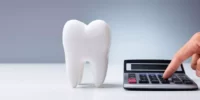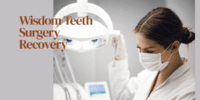The Connection Between Oral Health And Sleep Apnea

Good oral health is essential for overall wellbeing. But did you know that it can also help with sleep apnea? Recent research has shown a strong connection between the two, and understanding this relationship could be key to managing symptoms of sleep apnea. In this article, we’ll explore the link between oral health and sleep apnea, including the causes, symptoms and treatments.
Sleep apnea is a serious condition that affects millions of Americans every year. It occurs when a person’s breathing stops temporarily during sleep. This can lead to disrupted sleep, fatigue and other serious health issues. Poor oral hygiene has been linked to an increased risk of developing sleep apnea, as well as making existing symptoms worse. Left untreated, it can even lead to other complications such as high blood pressure or heart disease.
Fortunately, there are treatments available for those suffering from sleep apnea. Understanding the connection between oral health and sleep apnea is key to finding the right treatment plan for you or your loved one. So let’s dive in and explore how good oral health can help with managing symptoms of this common disorder.
Definition Of Sleep Apnea
It was a typical evening in the small suburban town. The sun had set and the sky was darkening, but one house glowed with light. Inside, an elderly man lay sleeping peacefully in his bed, unaware of the hidden danger lurking upon him. That night, he was unknowingly experiencing an episode of sleep apnea, a potentially dangerous medical condition that affects millions of people around the world.
Sleep apnea is a disorder characterized by pauses in breathing during sleep. These pauses can last anywhere from 10 to 30 seconds and can occur up to 30 times per hour of sleep. During these episodes, oxygen levels in the body drop significantly and can cause daytime drowsiness as well as other serious health issues such as high blood pressure and cardiovascular disease. Sleep apnea is commonly treated with lifestyle changes such as losing weight and quitting smoking, but some cases may require more intensive treatment such as surgery or the use of a continuous positive airway pressure (CPAP) machine. It is important to be aware of this serious condition so one can take steps to protect their health.
Symptoms And Causes Of Sleep Apnea
Moving on from the definition of sleep apnea, it is important to understand the symptoms and causes of this disorder. It is usually characterized by pauses in breathing during sleep, which can last for a few seconds to minutes. This can cause snoring, gasping, or choking during sleep as well. Some of the most common symptoms and causes of sleep apnea are:
- Poor oral health: Poor oral hygiene habits can result in a higher risk of gum disease and tooth decay, which increase the risk of developing obstructive sleep apnea.
- Inflamed tonsils: Tonsillitis or sore throat may also be a sign of an underlying condition that causes airway blockage such as enlarged tonsils or adenoids.
- Excess weight: Additional fat around the neck can put pressure on the upper airway and make it harder for air to move freely through the throat.
- Alcohol consumption: Drinking alcohol relaxes your muscles, which can make it more difficult to keep your airways open while you’re sleeping.
- Sleep deprivation: Lack of quality sleep has been linked to increased risk factors for both cardiovascular disease and metabolic disorders.
Apart from these primary factors, there are other contributing elements as well such as smoking, family history, age and gender. People who suffer from untreated sleep apnea often experience daytime fatigue due to lack of restful sleep at night, which can lead to serious health complications if left untreated. Therefore it is important to seek medical attention if any signs or symptoms arise that could indicate this disorder.
Diagnosis Of Sleep Apnea
Sleep apnea is a serious health condition, but it can be difficult to diagnose. To make matters worse, many of the symptoms associated with sleep apnea may mimic those of other medical conditions, making it even more complicated to identify. Like a foggy dreamscape, the symptoms of this disorder often remain hidden from view until a proper diagnosis is made.
In order to diagnose sleep apnea correctly, doctors must conduct an in-depth evaluation of the patient’s medical history and any underlying issues that might be causing their symptoms. During the evaluation process, physicians will look for signs such as snoring or pauses in breathing during sleep. They may also use specialized tests such as polysomnography or actigraphy to help them determine if the patient has sleep apnea.
Once diagnosed, patients can plan to receive treatment that can help them improve their oral health and reduce their risk of serious complications related to this condition. With appropriate care and lifestyle adjustments, those struggling with sleep apnea can regain control of their lives and start sleeping soundly once again.
Role Of Oral Health In Obstructive Sleep Apnea
Having discussed the diagnosis of sleep apnea, it is important to consider the role of oral health in obstructive sleep apnea. Oral health can be a contributing factor to the development of this condition. For example, those who have an overbite or a narrow upper jaw are more likely to suffer from sleep apnea. Other considerations include large tonsils, a thick neck circumference, and enlarged adenoids that can block airways when sleeping.
Excessive use of alcohol, smoking, and drug use can also contribute to oral health issues that increase the risk for sleep apnea. Furthermore, poor oral hygiene leading to gum disease, cavities, and other dental problems can be associated with this disorder. Therefore, maintaining good oral hygiene is key in reducing the risk for obstructive sleep apnea. Taking preventive measures such as brushing twice daily with fluoride toothpaste and flossing daily are recommended for optimal oral health care. Additionally seeing a dentist regularly for check-ups is crucial in order to detect the early signs of any potential dental problems that could contribute to obstructive sleep apnea.
Common Oral Health Issues And Treatments Related To Osa
Oral health issues are common for those with sleep apnea. Poor oral hygiene can lead to an increased risk of gum disease, tooth decay, and bad breath. It’s important to maintain good oral hygiene habits to prevent these issues from occurring or worsening.
| Issue | Description | Treatment |
|---|---|---|
| Gum Disease | Bacteria build-up on the teeth and gums causes inflammation, pain and bleeding. | Brush twice daily with fluoride toothpaste and floss regularly. Visit a dentist every 6 months for professional cleaning and check-ups. Take prescribed antibiotics if needed. |
| Tooth Decay | Acidic in the mouth due to poor nutrition can cause cavities, chipped or cracked teeth, and enamel erosion. | Regularly brush with a fluoride toothpaste, floss once a day, avoid sugary snacks/drinks, use a fluoride rinse as recommended by your dentist. Visit a dentist every 6 months for professional cleaning and check-ups. Fillings or other treatments may be necessary if decay is present. |
| Bad Breath | Bacteria in the mouth breaks down food particles causing an unpleasant odor that can become chronic. | Brush your teeth twice daily with fluoride toothpaste, floss once a day and use an antibacterial mouthwash as needed to clear away food particles responsible for bad breath. Visit your dentist every 6 months for professional cleaning and check-ups to rule out any underlying medical conditions that may be causing bad breath such as sinus infections or dental caries (tooth decay). |
It’s important to monitor your oral health closely if you have sleep apnea so that any issues can be addressed quickly before they worsen or cause more serious damage. Make sure you visit your dentist regularly so they can help diagnose any potential oral health problems you may have related to OSA and provide effective treatment options accordingly.
Benefits Of Good Oral Hygiene On Osa
Ironically, it turns out that taking care of one’s oral health can be an important factor in managing sleep apnea. While it may seem counterintuitive, good oral hygiene practices are essential for those struggling with the condition.
By brushing and flossing regularly, individuals can help keep their teeth and gums healthy, minimizing the risk of infections or disease. Furthermore, maintaining a healthy diet helps to reduce the amount of plaque buildup on the teeth, which can increase the chances of developing sleep apnea. Additionally, regular visits to a dentist can help identify any potential issues related to sleep apnea before they become too serious.
Overall, taking steps towards good oral hygiene will not only improve one’s overall dental health but may also have positive effects on sleep apnea as well. Therefore, it is important to prioritize proper oral hygiene care as part of an individual’s overall strategy for managing their condition.
Impact Of Poor Oral Hygiene Habits On Osa
Poor oral hygiene habits can have a significant impact on sleep apnea. Bacteria that accumulate on the teeth and gums can irritate the throat and nasal passages, interfering with breathing during sleep. If left untreated, this irritation can cause inflammation in the airways, narrowing them even further and increasing the risk of developing OSA. Poor oral hygiene also increases the risk of cavities and gum disease, which can lead to an increase in mucus production in the respiratory tract. This excess mucus can further narrow airways, leading to further obstruction of airflow during sleep.
In addition to these direct effects, poor oral hygiene may play a role in exacerbating existing OSA symptoms. For example, when bacteria accumulate on the teeth and gums it often causes bad breath. This bad breath may contribute to snoring, which is one of the primary warning signs of OSA. Furthermore, when people don’t brush their teeth regularly they are more likely to develop dental issues such as cavities or gum disease which can cause pain and soreness that makes it difficult to get comfortable while sleeping. As a result, they may experience more frequent awakenings throughout the night which can worsen their overall quality of sleep.
Regular brushing and flossing are essential for maintaining good oral health and reducing the risk of developing OSA or worsening existing symptoms. Additionally, those who already suffer from OSA should consider seeing a dental specialist for regular check-ups and cleanings as part of their overall treatment plan for managing their condition.
Healthy Diet And Its Effects On Osa
It’s no secret that what you eat has a significant impact on your overall health. OSA sufferers should take special care in monitoring their diets, as the food we ingest can play a role in the severity of our sleep apnea. A healthy diet can reduce inflammation and help improve the symptoms of OSA, while unhealthy snacks and meals can worsen it.
Think of it like this: If you’re an engine, food is your fuel. A diet rich in fresh fruits and veggies, whole grains, lean proteins, and healthy fats will keep your engine running smoothly. And if you throw some junk food into the mix? Your engine may sputter or worse — come to a complete standstill (which is pretty much how sleep apnea feels). So take care to maintain a balanced diet for optimal oral health and better sleep!
Dental Surgery And Its Effectiveness In Treating Osa
Dental surgery is a viable option for treating sleep apnea. It can be used to reposition the jaw or tongue, which can reduce the severity of OSA. A common type of dental surgery is called upper airway surgery. This involves removing excess tissue in the airway, such as tonsils or adenoids, which can obstruct breathing during sleep. Other forms of dental surgery, such as maxillomandibular advancement (MMA), involve repositioning the jaw and palate to create more space in the airway. In some cases, dentists may also suggest oral devices that are worn during sleep to keep the throat open.
Studies have shown that these surgeries are effective at reducing the symptoms of OSA. In one study involving MMA surgery, participants experienced a 77% reduction in their Apnea-Hypopnea Index (AHI) after treatment, indicating improved breathability when sleeping. Additionally, there were improvements in oxygen saturation levels and quality of life scores as well. However, it should be noted that these surgeries carry certain risks and can be expensive, so they may not be suitable for everyone.
Alternative Treatment Options For Osa
As the effects of oral health on sleep apnea become increasingly clear, it is important to look at alternative treatment options. While surgery has proven effective in treating OSA, there are other less invasive treatments available that could help reduce its severity or even eliminate it altogether.
One such option is the use of a Continuous Positive Airway Pressure (CPAP) machine. This device works by providing a steady stream of air into the lungs which helps keep the airways open and prevents them from collapsing during sleep. CPAP machines are easy to use and can be used in conjunction with other treatments such as lifestyle changes or medications to maximize their effectiveness. Additionally, they require no surgery and have minimal side effects.
Another option is mandibular advancement devices (MADs). These are custom-fitted mouthpieces which work by pushing your lower jaw forward slightly while you sleep. This helps to reduce snoring and also keeps the airways open so breathing is easier during sleep. MADs can be used alone or in combination with other treatments and although they may take some time to get used to, they can provide long-term relief from OSA symptoms.
Frequently Asked Questions
What Are The Long-Term Effects Of Sleep Apnea?
Sleep apnea is a serious sleep disorder in which a person’s breathing repeatedly stops and starts while they are asleep. This can have serious long-term effects on the sufferer’s physical, mental and emotional health. Left untreated, sleep apnea can cause hypertension, stroke, heart failure and even death.
It is important to identify the signs of sleep apnea early and have an accurate diagnosis made by a medical professional. Obstructive sleep apnea (OSA) can be treated with lifestyle changes such as avoiding alcohol use before bedtime and quitting smoking, but in some cases, more intensive intervention may be required. In these cases, surgery or dental appliances may be recommended to keep the airway open while sleeping.
In addition to the physical effects associated with OSA, it can also lead to difficulty concentrating or decreased productivity at work due to fatigue or poor quality sleep. It can also contribute to depression and anxiety as well as relationship problems due to snoring or other disruptive behaviors during sleep. The best way to mitigate these risks is to ensure that OSA is accurately diagnosed and treated appropriately with lifestyle changes or other interventions as recommended by your healthcare provider.
How Do I Know If I Have Sleep Apnea?
Do you often feel tired during the day even though you had a full night’s sleep? You might be suffering from sleep apnea. Sleep apnea is a serious condition that occurs when your breathing pauses or becomes shallow while sleeping. If left untreated, it can have long-term effects on your health and wellbeing. So, how do you know if you have sleep apnea?
Common symptoms of sleep apnea include loud snoring, nighttime choking or gasping for breath, waking up with a sore or dry throat and morning headaches. You may also wake up feeling exhausted despite having had enough sleep. If you experience any of these symptoms regularly, it’s important to see a doctor to get tested for sleep apnea.
Sleep studies are the most reliable way to diagnose sleep apnea. During this procedure, a technician will monitor your heart rate, breathing patterns and oxygen levels while you are sleeping. Based on this information, they can determine whether or not you suffer from sleep apnea and what type of treatment will best suit your needs. Treatments can range from simple lifestyle changes like losing weight to more invasive options such as wearing an oxygen mask at night. No matter what form of treatment is chosen, it’s essential to take action as soon as possible in order to minimize any potential damage caused by the condition.
Are There Lifestyle Changes I Can Make To Help With My Sleep Apnea?
Ah, sleep apnea. It can be a tricky beast to figure out, but the good news is, there are lifestyle changes that you can make to help with your sleep apnea. So buckle up and let’s take a look at how you can make small changes that can have big impacts on your sleep health!
First off, consider the fact that being overweight or obese is a major risk factor for developing sleep apnea. If you’re carrying extra weight around your neck or torso area, it could be putting pressure on your airways, making it harder for you to breathe while sleeping. Losing even just 10-15 pounds could make a huge difference in improving your sleep quality. Additionally, if you smoke or drink alcohol, both of these activities can also worsen the symptoms of sleep apnea. Quitting smoking and cutting down on alcohol consumption are two lifestyle changes which should be strongly considered if you’re dealing with sleep apnea.
Finally, another thing to consider when trying to manage your symptoms is maintaining good oral hygiene habits. Poor oral hygiene has been linked to an increased risk of obstructive sleep apnea (OSA). Brushing and flossing regularly and seeing a dentist for regular check-ups helps reduce bacteria buildup in the mouth and throat area which may help keep OSA at bay.
It’s important not to underestimate the power of making simple lifestyle changes when it comes to managing the symptoms of sleep apnea. From quitting smoking and reducing alcohol consumption to keeping up with dental hygiene and losing excess weight – these seemingly small adjustments have been shown to have positive impacts on both physical health as well as overall quality of life!
Are There Any Home Remedies That Can Help With Sleep Apnea?
If you’re looking for ways to help manage your sleep apnea, you may be wondering if there are any home remedies that can make a difference. While lifestyle changes are key in managing sleep apnea, there are some home remedies that you may find helpful.
One popular home remedy is using a neti pot or saline solution before bedtime. This helps to remove debris from your nasal passages and reduce inflammation that might otherwise disrupt sleep. You can also use an air humidifier to keep the air in your bedroom moist and comfortable, which can make it easier to breathe while sleeping. Additionally, avoiding heavy meals and alcohol before bedtime can help minimize nighttime breathing disruptions. Finally, sleeping on your side or stomach rather than on your back can reduce the risk of snoring and other issues related to sleep apnea.
These home remedies may not cure sleep apnea entirely but they can help improve your overall sleep quality and make it easier to manage the condition. With a combination of lifestyle changes and these simple remedies, you’ll be able to get a restful night’s sleep more easily.
What Is The Success Rate Of Dental Surgery In Treating Sleep Apnea?
It goes without saying that dental surgery can be an effective treatment for sleep apnea. The success rate of this procedure is something that needs to be taken into account when considering whether or not it is the right course of action. Like any other surgery, there are risks associated with dental surgery and the potential benefits must be weighed against them.
To get to the bottom of this question, one must look at studies conducted on the effectiveness of dental surgery in treating sleep apnea. Studies have shown that dental surgery can significantly reduce the severity of sleep apnea in patients who have undergone the procedure. However, it is important to note that not all patients experience the same degree of success with this type of treatment. Some may find that their symptoms persist after undergoing the surgery, while others may find that their symptoms improve significantly. As with all medical treatments, individual results will vary and should be discussed with a doctor before making a decision on whether or not to proceed with the procedure.
It’s fair to say that dental surgery can be an effective option for those suffering from sleep apnea, but it should only be considered after careful consideration of all factors involved and a discussion with a healthcare professional about potential risks and benefits. With proper monitoring and follow-up care, many people find relief from their sleep apnea symptoms through this form of treatment.
Conclusion
In conclusion, the connection between oral health and sleep apnea is strong. It’s estimated that up to 80 percent of sleep apnea cases are linked to poor oral health, making it important to take good care of your teeth and gums. Making lifestyle changes like quitting smoking, losing weight, or exercising regularly can help reduce the symptoms of sleep apnea. Additionally, home remedies such as using a humidifier or avoiding caffeine before bed can be beneficial for those with mild sleep apnea. Dental surgery is another option for more severe cases, with success rates ranging from 50-80 percent depending on the severity of the condition.
It’s important to remember that treating any kind of sleep disorder should be done in consultation with a doctor or dentist. Everyone deserves a good night’s rest and taking steps to improve your oral health can have a positive effect on your overall well-being.
Overall, understanding the connection between oral health and sleep apnea is critical for anyone experiencing this condition. With proper care and treatment, you can get back on track to living a healthy life where getting enough restful sleep is achievable.










